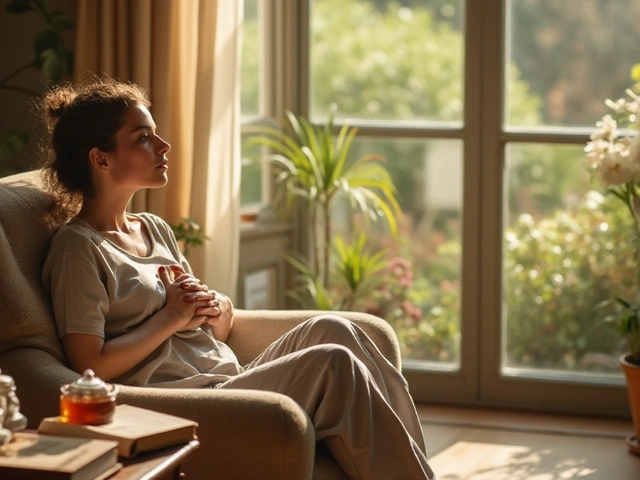If you’ve ever checked your heartbeat for the third time today or lost hours to the rabbit hole of online symptom checkers, you know how paralyzing health anxiety can be. The grip of those “what if” questions isn’t just annoying—it’s exhausting. Imagine spending half your brain power worrying about rare diseases you’ve barely heard of, just because of a twinge in your arm or a random ache. Some people—the lucky ones—shrug it off and go about their day. Others get stuck, and that worry just snowballs. The endless loop of checking, searching, and reassurance-seeking eats up more than time; it steals peace of mind.
Understanding Health Anxiety: What's Actually Happening?
Health anxiety, sometimes called hypochondria, isn’t just about being paranoid or dramatic—it’s a legit mental health thing. According to the DSM-5, it’s now in the “somatic symptom and related disorders” category. People with health anxiety can feel intensely preoccupied with the idea they have, or will soon have, a serious medical issue, even if medical tests say otherwise. Their worries aren’t calmed by a doctor’s “You’re fine.” In fact, their brains just find more reasons to panic. Fun, right?
The stats don’t lie—studies suggest around 5% of people will deal with health anxiety at some point. It can crop up in childhood, often triggered by a real health scare, but for many, it swings hard during the 20s and 30s. Major life changes, extra stress, or seeing someone else get sick can spark it out of nowhere. Some people are actually wired to notice body sensations more than others. Their brains just get stuck processing every blip, twitch, or weird feeling as a threat. Thanks, evolution!
What’s really wild is how real these feelings are. The body can literally start mimicking illness—racing heart, tummy troubles, even dizziness. This is the “fight or flight” system kicking in, but misfiring. Since health anxiety is about the fear of being sick, not actual illness, tests and scans only provide short-term comfort. That’s why reassurance never really seems to work long term.
So what does a typical day look like? Some wake up, scan their body for new symptoms, and mentally rank every ache. Many end up Googling symptoms (terrible idea), schedule frequent doctor visits, or constantly ask loved ones for reassurance. This isn’t just a private battle—it can hurt relationships, work, and even the enjoyment of simple things, like playing fetch with your dog or cuddling your cat. (Believe me, my golden retriever Murphy would be very annoyed if I was too anxious to play.)
Why Health Anxiety Feels So Hard to Shake
Why do those of us with health anxiety have such a hard time letting go of these worries? There are a few key reasons. First, it’s about brains wanting certainty where there isn’t any. The modern world is full of health info, but most of it is noise or worst-case scenarios. One weird article, and suddenly you’re convinced a headache means brain tumor. Studies on Internet health searches show they usually ramp anxiety up, not down.
Another big one is the body’s own feedback loop. The more you focus on sensations—breathing, pulse, tingling—the weirder and more intense they feel. This happens because our brains are wired to notice what we focus on. When you scan your body 20 times a day, small things start to feel major. That’s how simple tension can feel like chest pain, or random muscle twitches become terrifying.
Add on top of this a craving for reassurance. If you get a clean bill of health and immediately feel better, that relief never lasts. It’s like a drug: you need more and more, and it wears off faster. Psychologists call this the Reassurance Trap. Statistically, repeated medical checks lead to more anxiety in people with health anxiety, not less.
There’s also the myth of being “in control.” If you have a medical background, or you’ve seen someone close get sick, your brain assumes that knowledge and vigilance equals safety. Ironically, constant checking usually backfires. According to a Harvard Medical School review, repeated focus on health actually increases the risk of misreading benign symptoms as deadly. That’s partly why I don’t Google every new ache—and partly because Murphy and Whiskers look at me like I’ve lost my mind when I get worked up over tiny things.
People often think health anxiety is just about not trusting doctors. The truth is, it’s about not trusting uncertainty itself. The constant “what ifs” get louder every time you try to push them down or battle them head on. Some try to switch doctors again and again, worried someone else might miss something. Others fixate on one tiny body sensation for weeks. Either way, it’s exhausting.

The Hidden Costs: How Health Anxiety Steals Joy
Now let’s get honest about what health anxiety really does to your life. This isn’t just annoying—it’s a thief. It grabs your free time, ruins sleep, and turns fun stuff into chores. I know folks who stopped traveling because airports made them anxious about sudden illness, or who skip family picnics, afraid of catching bugs or having a public panic attack. Relationships take a hit, too. Constant seeking reassurance can wear down even the most patient partner. Friends may get annoyed or stop inviting you to things, not understanding what you’re fighting.
Work can suffer. One 2022 study found workers with high health anxiety took almost twice as many sick days, even with no real illnesses. Why? Every cough becomes a crisis. Every headache means a day off just to “watch it.” Productivity drops because it’s impossible to focus when part of your brain is running emergency drills all day. Getting a promotion or excelling at creative work gets way harder when so much energy is spent battling invisible fears. It’s tough to sit in meetings and care about quarterly profits when your mind is screaming about your heart rate.
Let’s talk money. Health anxiety leads to sky-high healthcare costs. The CDC reported that people with chronic health anxiety use healthcare services up to six times more than others. That’s specialist consults, lab workups, imaging—usually to confirm nothing is wrong. Those bills add up, especially in countries where out-of-pocket medical costs aren’t capped. For people on tight budgets, this is a double whammy: financial stress can worsen mental health, which then worsens the anxiety spiral.
It doesn’t even take full-blown panic to ruin normal life. The simple act of relaxing—watching TV, reading, or having a barbecue—gets interrupted by intrusive thoughts. You double-check your pulse during movie night or bail on plans to “monitor” a weird mole for a few hours. Left unchecked, health anxiety can chip away at all the things that make life bright and spontaneous. Knowing all this makes it obvious why people are desperate to get control back.
| Country | Estimated Prevalence | Healthcare Visits Linked to Health Anxiety (per year) |
|---|---|---|
| USA | 5.2% | ~ 23 million |
| UK | 4.6% | ~ 3.1 million |
| Germany | 4.7% | ~ 3.9 million |
| Australia | 4.8% | ~ 1.2 million |
| Japan | 3.9% | ~ 4.9 million |
Taking Back Control: Tactics for Breaking Free from the Worry Cycle
There’s good news: even if it feels impossible, people can break free from health anxiety’s grip. It’s not about ignoring health—or telling yourself “just stop worrying.” It’s about building new habits and rewiring how your brain reacts to uncertain information. Sound tough? It’s doable, and it doesn’t mean you have to become a fearless daredevil overnight.
- Stop Googling Symptoms (Seriously, Stop!). Most health anxiety triggers start with online symptom checking. Ban yourself from search engines for medical stuff. If you’re tempted, write your worry down instead, then review it after a set time. 9 out of 10 times, the urge fades.
- Use the “Wait and See” Method. Instead of reacting to every symptom immediately, delay response by hours or even a day. Most minor things pass, and studies show delayed checking significantly drops anxiety intensity over time.
- Limit Reassurance. Reserve medical appointments for real, persistent changes—not every twinge. Find a trusted doctor, discuss your patterns, and make an agreement: regular checkups, not “whenever you panic.” Relying less on others’ reassurance lets your own confidence grow.
- Practice Mindfulness Meditation. Research from Johns Hopkins found that daily mindfulness can drop overall anxiety scores by 40% within two months. Try guided meditations or mindful breathing—the goal isn’t to judge or fix sensations, just notice them without freaking out.
- Challenge Catastrophic Thinking. Write out your worst fears—and then come up with more likely, more boring explanations. (Spoiler: That ache in your neck isn’t a deadly tumor; maybe Whiskers slept on you funny.) Over time, your brain gets better at handling uncertainty with less drama.
- Set “Worry Time.” Give yourself a 15-minute slot to feel anxious each day, and any time worries pop up, jot them down and save them for that window. This tricks your brain off the constant 24/7 stress treadmill.
Many people need a little outside help. Cognitive Behavioral Therapy (CBT) is the gold standard. It works by breaking the habit of reassurance and teaching you to tolerate not having all the answers. A 2021 study showed that 70% of people with health anxiety felt “much improved” after 8 weeks of CBT. Some online programs (like the UK’s “Overcoming Health Anxiety” modules) are now available, often with pretty good results. Medications—like SSRIs—are sometimes part of the mix if anxiety is severe, but most doctors want to see if therapy alone can help first.
Don’t forget your roots—literally. Regular exercise, even just a walk with your dog, can lower baseline anxiety levels. Moving your body changes your body chemistry. Connecting with animals, like Murphy and Whiskers, can ground you in the present. If you’ve ever watched a dog nap with total trust and zero anxiety, it's a reminder things can be simple and safe—sometimes we just forget how to feel that way.
Diet matters more than people think. Too much caffeine, lots of sugar, or chronic dehydration can mimic anxiety symptoms. Watch what triggers your jitters. Even stabilizing blood sugar can cut down panic episodes. Most nutritionists agree: start simple—more water, fewer processed foods, some protein at every meal.
Last tip: social support isn't just a warm and fuzzy concept. Studies show people who talk to others about their anxiety, instead of bottling it up, recover faster. That could mean talking to a friend, joining a support group, or simply venting to someone who “gets it.” If your circle doesn’t understand, there are online communities packed with people facing the same thing every day.
None of these fixes are magic. Setbacks happen. It took me years to manage health worries, but days with Murphy at my feet and Whiskers on my keyboard remind me: anxiety doesn’t have to run the show. It shows up, then it quiets down, just like any other thought. With patience, support, and practical tools, you start trusting yourself again—even if your mind tries to trick you into Googling your way into a panic spiral. Life’s too short, and honestly, the pets don’t care about that weird freckle anyway.







